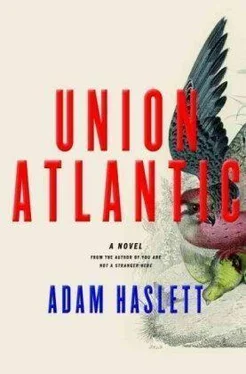“First guy I ever worked for,” he said, “could rattle off every loan on his book, quote you the rate, and tell you who was past due, all without so much as glancing at a balance sheet. Sean Hickey. Manager for Hartford Savings. He told me to forget whatever they’d taught me and learn to read a man’s face. That was the training. To sit beside him in meetings with the local entrepreneurs and give him my thumbs-up or thumbs-down. I picked the ones with the flash — the talkers. He rejected every one of them. You’re thinking short, he’d say. You want steady. All that seems like a hundred years ago. It’s a trader’s game now, a pure trader’s game.”
The Bierstadt canvas hanging on the wall behind Union Atlantic’s chairman and CEO depicted an untouched Yosemite in early fall or late spring, the verdant grass and mountain lake beneath the peaks struck by columns of sun descending from a gap in the clouds. Half Dome was capped with snow melting into falls that ran off the lower cliffs, the fine mist emanating from the cascades of water giving the painter away for the Romantic he was, that mystical, German idealism struck here in a grander key on the subject of the American West.
Thirty-eight million, Henry thought. That’s what Holland had earned last year. And if the board forced him out, he’d collect twice that.
Through the doorway into the private dining room, a waiter in a black suit and tie approached, a plate in each hand.
“Cracked native lobster tails, gentlemen, served with poached organic eggs, papaya salsa, and Old Bay hollandaise sauce. Fresh ground pepper with your breakfast, sir?”
“No, thank you,” Henry replied, unfurling his napkin.
“I appreciate you coming here this morning,” Holland said. “I don’t know if I ever told you, but I voted for you back when I was at Chase, when I was on your board. We were glad to have you for the job.”
Henry had known as much. Holland would have preferred the appointment of a colleague from the private sector, someone more instinctively friendly to the industry’s interests. But once others had coalesced around Henry, he’d taken a friendly approach.
“You worry in the right way,” he said. “Which is important.”
If the FBI and the U.S. attorney’s office had had their druthers, they would have staked out Union Atlantic for months in order to build their case all the way up to Holland. But given the size of the problem, Henry hadn’t been able to wait. He had come through the front door, as it were, only forty-eight hours ago, and straightaway Holland had offered Fanning and his trader up on a platter. The bank had been running its own internal investigation, he claimed, which showed Fanning involved in rogue activity and attempts to cover his tracks. Given that Holland’s lawyers were themselves former federal prosecutors, former banking regulators, and former IRS commissioners, he knew the drill well enough: hide nothing, or at least appear to hide nothing.
In the months and years ahead, at a cost of millions, the matter of Holland’s own culpability would be the subject of multiple lawsuits, civil and criminal, with teams of his attorneys vetting every discovery request of every party, the lives of associates in some corporate firm devoted to nothing else, billing thousands of hours as they went, as the perfectly straightforward question of what he had known and when was fed into the numbing machinery of modern litigation, there to be digested at a sloth’s pace. Young lawyers would buy condominiums or town houses with their bonus checks, employing architects and builders and decorators who would, in turn, spend a little more themselves on cars or vacations or flat-screen TVs, though that particular trickle from the economy of distress would barely register against the job losses bound to come with the restructuring of Union Atlantic Group.
But all that was for later. Personally, Henry suspected Holland had approved of the Finden Holdings arrangement and the proprietary trading scheme it had facilitated as a way to save his share price. But it would serve no practical end to indulge in an airing of his views. What Henry needed was a functioning institution capable of playing its role as the situation unfolded. If Holland was the man who could deliver that, then so be it. Others would decide his fate.
“It’s a sad case, really,” Holland observed. “Doug was a bright guy. If anything, I probably promoted him too quickly. I blame myself for that. Obviously the pressure got to him. He lost his judgment. I don’t know if you heard about the other stuff … I hesitate to mention it. But it seems he might have gotten into some trouble with this kid, a boy actually, might even have been underage, I’m not sure. Surprised the hell out of me. I’d never seen any indication of that. But I guess it fits the pattern. You deceive people in one part of your life, and if you get away with it, it just takes over.”
He paused here, trying to gauge his progress with Henry. Apparently doubtful of his headway, he pressed on.
“Off the record,” he said, “there’s a good chance this’ll make your sister’s life easier. I don’t think Doug will be out there in Finden much longer. He’ll have to pay his lawyers with something.”
This had occurred to Henry, though he had said nothing about it to Charlotte. Only a few days ago she had learned that her legal victory had been reversed. The news had struck her hard. Winning that case had at last justified her crusade, not only against Fanning and the town but against her larger enemy: that general encroachment of money and waste and display. Having it taken away had crumpled something in her. Her hectoring voice had grown subdued. When he’d once more mentioned the idea of moving, she had made none of her usual protests. Knowing that he was going to be in Boston, he’d asked Helen to set up an appointment at the assisted-living home that Cott Jr. had recommended, and he and Charlotte were scheduled for a visit there that afternoon.
What good would it do now to share the news of Fanning’s downfall? It would only give her false hope. Even if the man were forced to sell, the house itself wasn’t going anywhere.
He took a bite of lobster, letting his lack of response to Holland speak for itself.
“Fanning’s not my concern,” he said eventually. “Perhaps we could proceed to business?”
“Of course.”
“Let me start by saying that if you or your board is under the impression that Union Atlantic is too big to fail, you’re mistaken. There’s no question here of a bailout. If you go under, the markets will take a substantial hit, but with enough liquidity in the system we can cut you loose. I hope you understand that.”
This, of course, was a bluff. Henry had already begun receiving calls from the Treasury Department. The secretary was confident, his deputies said in their transparent euphemism, that the Federal Reserve shared his concern about market stability. Translation: the White House is watching this one. The administration, while opposed under free market theory to the government rescue of a failing corporation, didn’t want to see Union Atlantic fall apart. There were perfectly prudential reasons for this, many of which Henry agreed with, but the chatter coming out of the executive branch at the moment suggested another concern: the argument for the invasion of Iraq was hitting its stride now, and an event of this size could change the domestic and congressional equation. They didn’t want distractions. That was the gist of it. By all means avoid the appearance of rewarding speculators — no moral hazard — but now’s not the time for stringency.
Would he feel the satisfaction of justice done if an operator like Holland were brought to heel? Of course. Who wouldn’t? But whatever spleen the liberals liked to vent on the captains of industry, there were certain hard facts that had little to do with individual actors. Five hundred points off the Dow was one thing. Disruption of the credit markets was another. Dry up the lending system and the losses would no longer redound to the investor class alone. The man working for the Texas theme-park company that had been bought out with leveraged debt it could no longer service would lose his paycheck soon enough. As a general matter, particularly in the mouths of politicians, Henry disliked the use of personal anecdotes to illustrate the workings of the economy. They were almost always a distortion, a falsely simple story of cause and effect. Truth lay in the aggregate numbers, not in the images of citizens the media alighted upon for a minute or two and then quickly left behind. Currency devaluations created more misery than any corporate criminal ever would. What the populist critics rarely bothered to countenance was the shape of things in the wake of real, systemic collapse. In Argentina, the middle class was picking through garbage dumps. The failure of Union Atlantic wouldn’t deliver the country there, but then again, these were uncertain times. And whose risk was that to take?
Читать дальше












